Asia
Bisexual LGBTQ+ YouTuber challenges fellow South Koreans
“It’s gonna take a long time for Korea to change- I’ll just do whatever I can, but I can’t be overwhelmed or too stressed”

SEOUL, Republic of Korea – Kelsey the Korean is a bisexual YouTuber best known for her refreshing directness and crazy life stories. Made obvious by her username, she is a Korean named Kelsey making videos in English about South Korea, LGBTQ issues, sex, mental health, her family feuds and more, with the aim of fostering a no-bullshit insight into South Korean society.
You’d never guess by watching Kelsey’s videos about her colorful sex life or uncensored stories about her over-bearing “tiger mom,” but Kelsey is actually an introvert.
“A lot of people assume that I’m extraverted but it’s like, uhh … I’m not. In reality it’s one of the best jobs [YouTuber] for an introvert ‘cause you don’t have any co-workers basically, and you can just talk to a camera,” she said. “People sort of get scared when they meet me in person — or startled — because they’re like, “You’re so quiet, are you mad?’”
As an open bisexual woman in a conservative country, Kelsey is brave.
“It’s harder than North America in general, it depends on which district obviously [of America] because I’ve heard even in America there are some places where it’s as conservative as Korea, so I don’t want to make it like a dichotomy where the West is so ‘open’ and Korea is ‘not,’” she said. “In Korea it’s definitely harder to find people in my generation [25- to 30-years old] that are open — which is a little bit shocking to me — but it’s easier in other ways because Korean people are not very outspoken.”
A 2021 survey showed that 26.5 percent of South Koreans would accept an LGBTQ neighbor, 13.8 percent would accept an LGBTQ co-worker and 5.3 percent would accept an LGBTQ best friend.

Kelsey is not a complete stranger to anti-LGBTQ hate.
In one of her YouTube videos she visited gay Pride in Seoul which was met with homophobic protestors.
“Last year was really shocking because there were so many Christian protestors who were really mad, and the shocking thing was they even brought their children, who were like 5 or 7 and made them hold ‘gay people have AIDS’ [signs],” she said.
Seoul’s Queer Culture Festival (gay Pride) hit a wall this year when it was denied a permit by the Seoul Metropolitan Government, despite holding the festival in Seoul Plaza for many years. The Seoul Metropolitan Government’s reasoning was that another group had requested access to Seoul Plaza on July 1 so the government gave the other — a Christian youth concert — priority. Despite this setback, Seoul’s Queer Culture Festival organizers didn’t let this stop them celebrating pride at an alternative space.

South Korea has rapidly progressed since the Korean War and society is more open-minded and accepting but society is still not open enough to accept openly LGBTQ people. How does Kelsey feel about the future of LGBTQ rights in Korea?
“Oh God, I’ve only been following gay rights in Korea for five years,” she said. “It’s not good because since the Yoon administration, they’re making it harder definitely.”
Yoon Suk-Yeol is the current politically conservative president of South Korea.
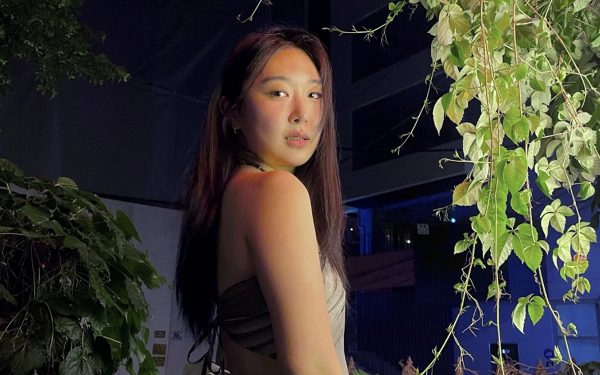
“As for the future of LGBTQ rights in Korea, I don’t know. It could go either way in my opinion. Even in the youth I don’t see that much change, but our youth percentage is declining, so there’s gonna be more boomers as time goes on and they’re not gonna be open. They’re gonna be really boomer,” she said.
Although Kelsey wants more LGBTQ acceptance in Korea, education on transgender identity in a Vancouver school was a step too far for her.
“With LGBTQ rights, Korea is very conservative but I was really taken aback by how far the west seems to have taken it because when I was in Vancouver six months ago I became friends with this 8-year-old boy and he was in elementary school. He said that in Vancouver it was very left politically and in his public elementary school during sex-ed they taught his class that there [are] infinite genders. Then a trans person came in and just talked about his life trauma — I guess — and how they wanted to be called ‘they.’” she said. “I [was] so shocked to hear that because, personally — maybe I’ll change my mind and be so shocked at how conservative I am reading back to this article in 10 years — but right now that is too far for me. I don’t want it to be in public education [that] you can be trans or you can be gay when you’re 8- [years old].”
Kelsey wants to uplift other LGBTQ viewers who watch her YouTube channel. Her words of advice?
“First of all be patient because people like me who are Gen-Z and multicultural pick the best country they’ve been in — in regards to how it benefits them — and they’re like ‘Why isn’t my country, right now, not fitting that standard?’” she said.
Kelsey calls herself a multicultural Korean because she lived in Australia and Canada.
“It’s gonna take a long time for Korea to change,” she said. “The conclusion I came to is that I’ll just do whatever I can, but I can’t be overwhelmed or too stressed.”
Myanmar
LGBTQ+ advocacy group joins Myanmar earthquake relief effort
March 28 quake killed thousands, devastated country’s second-largest city

A powerful earthquake that rocked Myanmar on March 28 unleashed devastation across the central part of the country.
The U.S. Geological Survey measured the quake at 7.7, and pinpointing its epicenter roughly 10 miles west of Mandalay, the country’s second-largest city. A 6.4-magnitude aftershock jolted the area 12 minutes later, compounding the destruction and deepening the crisis for a nation already strained by conflict.
The earthquake struck with terrifying intensity near its epicenter, wreaking havoc on Mandalay and the nearby city of Sagaing.
Mandalay, a bustling city of approximately 1.5 million residents, bore the brunt of the destruction. Among the most striking losses was the 12-story Sky Villa Condominium, which collapsed, leaving scores trapped beneath the wreckage. Rescue workers scrambled to pull survivors from the rubble, but the rising death toll underscored the tragedy’s magnitude.
In Sagaing, which is located closer to the epicenter, more than 70 percent of buildings sustained damage. The Ava Bridge, an essential artery spanning the Irrawaddy River, collapsed, cutting off a critical connection to Mandalay. The earthquake’s shallow depth of less than seven miles amplified its power, reducing homes, temples, and schools to rubble.
The earthquake’s death toll continues to climb, with at least 3,649 confirmed dead, more than 5,000 injured, and approximately 145 people missing. Amid the widespread devastation, questions loom about the impact on vulnerable populations. The Los Angeles Blade reached out to Colors Rainbow, an organization advocating for LGBTQ+ rights in Myanmar, to understand how the crisis has affected one of the nation’s most marginalized communities.
Colors Rainbow Executive Director Hla Myat Tun spoke about how his organization is working to address the crisis faced by Myanmar’s LGBTQ+ community in the aftermath of the earthquake.
Colors Rainbow has implemented a system of multipurpose cash transfers, directing funds to local LGBTQ+ partner organizations. These grassroots partners, in turn, provide essential support to affected individuals that includes emergency cash assistance, food, non-food items, clean water, and basic emotional support tailored to the immediate needs of their communities.
“We estimate that around 500–800 LGBTQ individuals have been impacted in the affected areas, particularly in Mandalay Region, Sagaing Region, and southern Shan state,” said Hla Myat Tun. “So far, we have been able to directly assist around 80–100 LGBTQ individuals.”
Hla Myat Tun told the Blade that Colors Rainbow is actively gathering data to assess the specific challenges that LGBTQ+ people are facing in the aftermath of the earthquake.
Preliminary observations, he noted, point to heightened vulnerability among LGBTQ+ people, driven by social exclusion and limited access to mainstream humanitarian aid. Hla Myat Tun, however, emphasized more comprehensive information is necessary to fully understand the scope of their needs and vulnerabilities in this crisis.
“We are partnering with international LGBTQ and feminist organizations that focus on displaced communities,” said Hla Myat Tun. “These partners provide emergency funds, and we coordinate with local LGBTQ groups to deliver aid directly to affected individuals on the ground.”
Addressing reports of military restrictions on humanitarian aid, Hla Myat Tun explained how Colors Rainbow is managing to reach LGBTQ+ people who are in conflict zones and areas the military junta controls. Hla Myat Tun highlighted the importance of the organization’s trusted local LGBTQ+ partners, who are embedded in these regions. Their presence and established networks, he said, are vital in navigating restricted areas and ensuring that aid reaches the LGBTQ+ people who are most in need.
Hla Myat Tun also provided insight into how Colors Rainbow is tailoring its relief efforts to meet the LGBTQ+ community’s specific needs.
He said his organization is gathering information directly from LGBTQ+ people through close coordination with its local partners, relying on both formal and informal communication channels. Hla Myat Tun told the Blade his team conducts daily check-ins via quick telephone calls, ensuring a continuous flow of information to guide their response efforts despite limited internet access, electricity and other challenges.
“Our approach is collaborative — we set strategies and share responsibilities to respond flexibly and safely, based on the rapidly changing local context,” he said. “Personal stories are being documented, but for security reasons, we are cautious about sharing them publicly.”
When asked whether staff or volunteers had harassment, discrimination, or violence while delivering aid — a concern given the precarious legal and social climate for LGBTQ+ people in Myanmar — Hla Myat Tun said there have been no reported incidents thus far.
“So far, we haven’t received any reports from our staff or local partners about harassment or violence while delivering aid,” he noted, emphasizing Colors Rainbow remains vigilant and has implemented robust safety protocols to protect all involved.
Colors Rainbow relies primarily on funding from international LGBTQ+-focused partners. He noted, however, humanitarian funding specifically dedicated to LGBTQ+ communities remains vastly under-resourced, relative to the pressing needs on the ground. Hla Myat Tun said this shortfall severely limits the scale and reach of Colors Rainbow’s efforts.
“While Myanmar’s legal framework remains outdated, societal attitudes — especially during the civilian government — have shown signs of progress,” said Hla Myat Tun. “We have seen positive change thanks to the work of local LGBTQ organizations.”
“In the current crisis, many communities are working together despite legal barriers. However, in areas without LGBTQ-led organizations, inclusive humanitarian responses are still lacking,” he added. “There’s an urgent need for international humanitarian actors to understand and implement LGBTQ-inclusive practices in Myanmar.”
When asked about long-term strategies to support the recovery and resilience of LGBTQ+ communities as Myanmar rebuilds, Hla Myat Tun affirmed Colors Rainbow is deeply committed to fostering resilience. The organization’s initiatives include leadership development, community empowerment through training and workshops, sub-granting programs, and organizational development support. He also highlighted Colors Rainbow’s advocacy for LGBTQ+-inclusive policies and collaboration with ethnic groups to promote an inclusive federal democracy, and specifically thanked Outright International, a global LGBTQ+ and intersex rights group, for “amplifying our work.
“This kind of international attention shines a spotlight on the challenges LGBTQ communities in Myanmar are facing and helps open doors for more support,” Hla Myat Tun told the Blade. “It also boosts visibility and solidarity, both locally and globally, which we deeply appreciate.”
India
LGBTQ+ poets included in India’s premier literary festival
Sahitya Akademi seen as mirror of government’s cultural agenda

India’s premier literary institution on March 7 announced it would allow LGBTQ+ poets to participate in its marquee Festival of Letters in New Delhi.
The Sahitya Akademi, often seen as a mirror of the government’s cultural agenda, for the first time allowed these poets into a high-profile poetry reading at the Rabindra Bhavan. They shared the stage with more than 700 writers across 50 languages.
Culture and Tourism Minister Gajendra Singh Shekhawat kicked off the Festival of Letters with Mahesh Dattani, the acclaimed English-language playwright famed for his provocative works, as the main guest. Dubbed Asia’s grandest literary gathering, the Sahitya Akademi took place over six days under the “Indian Literary Traditions” theme.
The 2025 Festival of Letters showcased a sweeping range of voices — young writers, women writers, Dalit authors from marginalized castes, Northeast Indian scribes, tribal poets, and LGBTQ+ poets — cementing its reputation as a literary kaleidoscope.
Kalki Subramaniam, a leading transgender rights activist and author, on March 9 chaired a literary session titled “Discussion on Literary Works of LGBTQ Writers in the 21st Century,” which spotlighted contemporary queer voices.
“It was enriching to listen to the profound thoughts of LGBT writers from various parts of the country in their speeches,” said Subramaniam. “The session was particularly memorable with the participation of A. Revathi Amma from Tamil Nadu, Reshma Prasad from Bihar, Sanjana Simon from New Delhi, and Devika Devendra Manglamukhi and Shivin from Uttar Pradesh and Aksaya K Rath from Orissa.”
Subramaniam discussed how global politics shape gender rights and the persistent erasure of trans identity, urging a unified push for solidarity within the LGBTQ+ community. She stressed the vital need to elevate queer works and writers, casting their voices as essential to the literary vanguard.
“It was a pleasure to meet great writers from around the country in the festival as well as meet my writer activist friends Sajana Simon and Revathi Amma after a long time,” said Subramaniam.

The government on March 12, 1954, formally established the Sahitya Akademi. A government resolution outlined its mission as a national entity tasked with advancing Indian literature and upholding rigorous literary standards; a mandate it has pursued for seven decades.
The Sahitya Akademi in 2018 broke ground in Kolkata, hosting the country’s first exclusive gathering of trans writers, a landmark nod to queer voices in Indian literature.
Hoshang Dinshaw Merchant, India’s pioneering openly gay poet and a leading voice in the nation’s gay liberation movement, on March 9 recited a poem at the Festival of Letters, his verses carrying the weight of his decades-long quest for queer recognition. He later thanked the session’s chair for welcoming the community, a gesture that underscored the event’s third day embrace of diverse voices.
The Sahitya Akademi in 2024 honored K. Vaishali with the Yuva Puraskar for her memoir “Homeless: Growing Up Lesbian and Dyslexic in India,” a raw account of navigating queerness and neurodivergence. Vaishali in a post-win interview reflected on India’s deep-seated conservatism around sexuality, noting she wrote from a place of relative safety — an upper-caste privilege that shielded her as she bared her truth. The award, she said, was the Akademi’s indelible seal on her lived experience, a validation no one could challenge.
The Sahitya Akademi’s inclusion of LGBTQ+ writers in its main program this year jars with the Bharatiya Janata Party-led government’s conservative stance, which, in 2023, opposed same-sex marriage in the Supreme Court, arguing it erodes Indian family values. Yet, under Shekhawat, the Sahitya Akademi’s spotlight on queer voices at the Rabindra Bhavan suggests it could be a tentative crack in a regime typically rooted in tradition.
The Festival of Letters hosted a translators’ meeting on March 10, spotlighting P. Vimala’s 2024 award-winning Tamil translation of Nalini Jameela’s “Autobiography of a Sex Worker,” a work steeped in marginalized voices that include queer perspectives.
This platform gained significant support from the BJP-led government, with Shekhawat securing a 15 percent budget increase to ₹47 crore ($5.63 million) in 2024. In Tamil Nadu state, however, Dravida Munnetra Kazhagam’s Chief Minister Muthuvel Karunanidhi Stalin, has long opposed such cross-linguistic efforts, fearing dilution of Tamil identity amid decades of anti-Hindi sentiment — a tension the Sahitya Akademi’s inclusive showcase sought to bypass.
‘The Akademi is very inclusive and has a friendly festival ambience,” Subramaniam told the Los Angeles Blade.
Japan
Japan’s marriage equality movement gains steam
Nagoya High Court this month ruled lack of legal recognition is unconstitutional
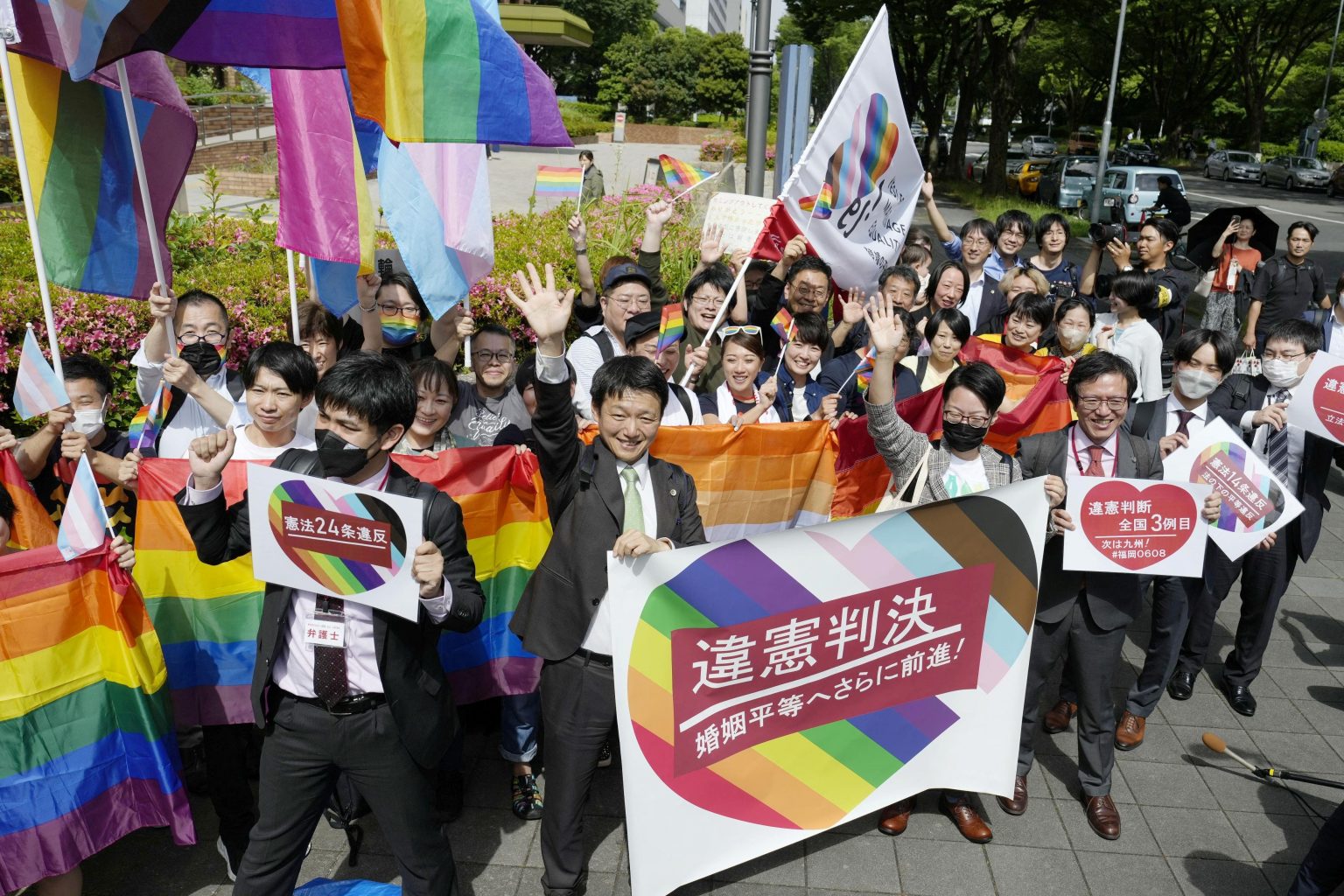
Japan’s Nagoya High Court on March 7 ruled the lack of legal recognition of same-sex marriages violates the country’s constitution.
The plaintiffs argued Japan’s Civil Code and Family Registration Act, which does not recognize same-sex marriages, violates the country’s constitution. They cited Article 14, Paragraph 1, which guarantees equality under the law and prohibits discrimination based on factors that include race, creed, sex, or social status. The plaintiff also invoked Article 24, Paragraph 2, which emphasizes that laws governing marriage and family matters must uphold individual dignity and the fundamental equality of the sexes.
The plaintiffs sought damages of 1 million yen ($6,721.80) under Article 1, Paragraph 1, of the State Redress Act, which provides for compensation when a public official, through intentional or negligent acts in the course of their duties, causes harm to another individual. The claim centered on the government’s failure to enact necessary legislation, which prevented the plaintiff from marrying.
The court noted same-sex relationships have existed naturally long before the establishment of legal marriage. It emphasized that recognizing such relationships as legitimate is a fundamental legal interest connected to personal dignity, transcending the confines of traditional legal frameworks governing marriage and family.
The court further observed same-sex couples encounter significant disadvantages in various aspects of social life that cannot be addressed through civil partnership systems. These include housing challenges, such as restrictions on renting properties, and financial institutions refusing to recognize same-sex couples as family members for mortgages. Same-sex couples also face hurdles in accessing products and services tailored to family relationships. While the court deemed the relevant provisions unconstitutional, it clarified that the government’s failure to enact legislative changes does not constitute a violation under the State Redress Act.
The lawsuit, titled “Freedom of Marriage for All,” brought together a large coalition of professionals, including more than 30 plaintiffs and 80 lawyers. They filed six lawsuits in five courts throughout Japan.
“We filed these lawsuits on Valentine’s Day, Feb. 14, 2019, in Tokyo, Osaka, Nagoya, and Sapporo, and in September of that year in Fukuoka,” noted Takeharu Kato, director of Marriage for All Japan. “Then, in March 2021, the Sapporo District Court handed down the first ruling declaring the current laws unconstitutional, which received extensive worldwide media coverage. Subsequently, the Osaka District Court unfortunately ruled that the current law is constitutional, but among the 10 rulings handed down so far, nine have ruled that not recognizing marriage equality is unconstitutional.”
Kato is a lawyer who is part of the legal team in the Sapporo case. He is also a board member of Marriage for All Japan, a marriage equality campaign.
“The MFAJ (Marriage for All Japan) is fully supporting the lawsuits by publicizing the current status of the trials and the rulings in our websites and social networks, setting up press conferences at the time of the rulings,” Kato told the Los Angeles Blade. “We also make the best of the impact of the lawsuits in our campaign by holding events with the plaintiffs of the lawsuits and inviting them to the rally at Diet (the Japanese parliament) members’ building.”
Kato said the campaign has significantly shifted public opinion, with recent polls indicating more than 70 percent of Japanese people now support marriage equality — up from approximately 40 percent before Marriage for All Japan launched. He also noted 49 percent of Diet members now back marriage equality.
Japan is the only G7 country that does not legally recognize same-sex couples. Taiwan, Nepal, and Thailand have extended full marriage rights to gays and lesbians.
Expressing disappointment, Kato said many Japanese politicians continue to resist marriage equality, despite overwhelming public support. Kato added Marriage for All Japan expects the Supreme Court to rule on their lawsuits in 2016.
“We believe that the Supreme Court will also rule that the current laws are unconstitutional,” he said. “However, the Supreme Court’s ruling alone is not enough to achieve marriage equality under the Japanese legal system. We should put more and more strong pressure on the Diet to legalize marriage equality in Japan as soon as possible.”
Several municipalities and prefectures issue certificates that provide limited benefits to same-sex couples, but they fall short of equal legal recognition.
Prime Minister Fumio Kishida’s government has faced mounting pressure on the issue as public support for marriage equality has surged in recent years. Kishida has yet to push reforms within his own party; encountering fierce opposition from its traditional leadership.
His government in June 2023 passed Japan’s first law addressing sexual orientation and gender identity, aiming to “promote understanding” and prevent “unfair discrimination.” Activists, however, widely criticized the legislation on grounds it fails to provide comprehensive protections or extend marriage rights to same-sex couples.
Thailand
Thailand marriage equality law takes effect
Country is first in Southeast Asia to allow same-sex couples to marry
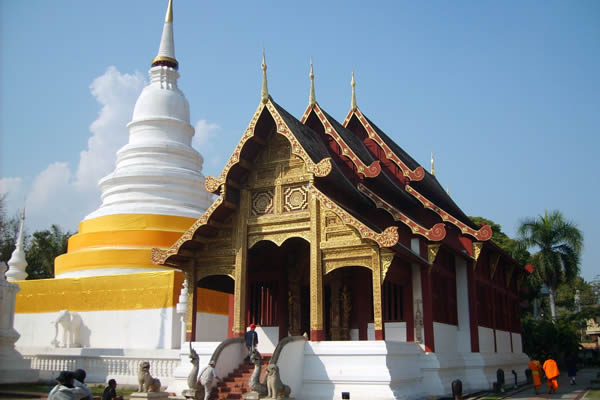
A law that extends marriage rights to same-sex couples in Thailand took effect on Thursday.
Media reports indicate hundreds of same-sex couples tied the knot across the country once the law took effect. The Bangkok Post reported Bangkok Pride and authorities in the Thai capital organized a mass wedding that took place at a shopping mall.
“Today, the rainbow flag is proudly flying over Thailand,” said Prime Minister Paetongtarn Shinawatra on X.
Thai lawmakers last year approved the marriage equality bill. King Maha Vajiralongkorn signed it last September.
Thailand is the first country in Southeast Asia to extend marriage rights to same-sex couples.
Same-sex couples can legally marry in Taiwan and Nepal.
India
India hotel chain policy allows for cancellation of unmarried couples’ reservations
OYO Rooms issued directive on Jan. 9, requires proof of relationship

Traveling in India is becoming increasingly challenging for unmarried couples, with LGBTQ+ partners facing even greater hurdles.
OYO Rooms, a major hospitality chain, on Jan. 9 issued a directive to its partner hotels in Meerut, a city that is 50 miles from New Delhi, that allows them to refuse to allow unmarried couples to make reservations.
The chain now requires all couples to present valid proof of their relationship at check-in, even for online bookings. The company stated the decision aligns with local social sensibilities and hinted that the policy might be expanded to other cities based on feedback from the ground.
OYO, which partners with more than half a million hotels across India, operates not only within the country but also in other parts of Asia, the U.S., and Europe. According to sources familiar with the policy change, the company previously received feedback from civil society groups, particularly in Meerut, urging action on this issue. Residents from other cities have also petitioned to disallow unmarried couples from booking rooms in OYO hotels.
OYO and other budget hotel chains for years have been perceived in India as safe spaces for couples seeking privacy. This policy change, however, has sparked criticism online. Many view it as a departure from the brand’s long-standing image as a haven for unmarried couples. In a society where many couples struggle to find private spaces at home or elsewhere, this move has drawn backlash for restricting access to affordable accommodation.
LGBTQ couples, who often rely on OYO and other budget hotels for privacy, may feel the impact of this decision more acutely.
The Supreme Court in 2023 ruled LGBTQ+ people have the right to form relationships without discrimination, but it also ruled against marriage rights for same-sex couples. OYO’s policy, and others like it, further limit the availability of same spaces for them as they continue to face marginalization.
India in 2023 welcomed approximately 9.23 million foreign tourists, an increase from 7 million in 2021, though still below the pre-pandemic peak of 10.93 million in 2019. While there are no specific records for LGBTQ+ tourists, the International Gay and Lesbian Travel Association. Restrictive policies like OYO’s directive, however, could create difficulties for LGBTQ+ travelers seeking budget accommodations.
“OYO is committed to upholding safe and responsible hospitality practices,” said OYO North India Region Head Pawas Sharma in a statement to Press Trust of India. “While we respect individual freedoms and personal liberty, we also recognize our responsibility to listen to and work with law enforcement and civil society groups in the micro-markets we operate in. We will continue to review this policy and its impact periodically.”
The multinational company claims to be reshaping outdated perceptions by presenting itself as a brand that offers safe experiences for families, students, business travelers, religious pilgrims, and solo travelers.
A survey that Booking.com conducted in 2023 found, 91 percent of LGBTQ+ travelers in India prioritized their personal safety and well-being when choosing travel destinations, a notable increase from 70 percent in the previous year.
“I am surprised OYO is doing this,” said Kalki Subramaniam, a global transgender activist, artist, and founder of the Sahodari Foundation, an organization that supports trans people in India. “What are they trying to establish through this moral code? Do they really care about every customer? If so, how can they introduce something like this? I would like to know what their stance on LGBTQ rights is.”
The Washington Blade made multiple attempts to contact OYO founder Ritesh Agarwal and his company for comment, but has received no response.
Sudhanshu Latad, advocacy manager at Humsafar Trust, a prominent LGBTQ+ organization in India, expressed uncertainty about the policy’s impact on the LGBTQ+ community.
“Two boys in India are not considered married anyway, so if two boys book a hotel room together, no one usually bothers unless one is feminine or gives off a hint,” Latad said. “However, for a trans woman and a man, it could be a challenge.”
Latad referenced the Supreme Court’s 2023 marriage equality ruling, which allows trans people who fit into the binary system of gender to legally marry.
“Affluent transgender couples may choose bigger hotels, which are less of a challenge, but economically marginalized individuals often end up paying bribes to hotel staff at budget hotels like OYO Rooms,” he added.
Latad further explained that tourists can generally be divided into two categories: Affluent leisure travelers who prefer luxury hotels, and backpackers.
“If backpackers are gay white men, they usually face no trouble securing a room,” he said. “OYO’s policy, however, seems discriminatory towards heterosexual unmarried couples.”
India
Indian Supreme Court rejects marriage equality ruling appeals
Judges ruled against full same-sex relationship recognition in 2023
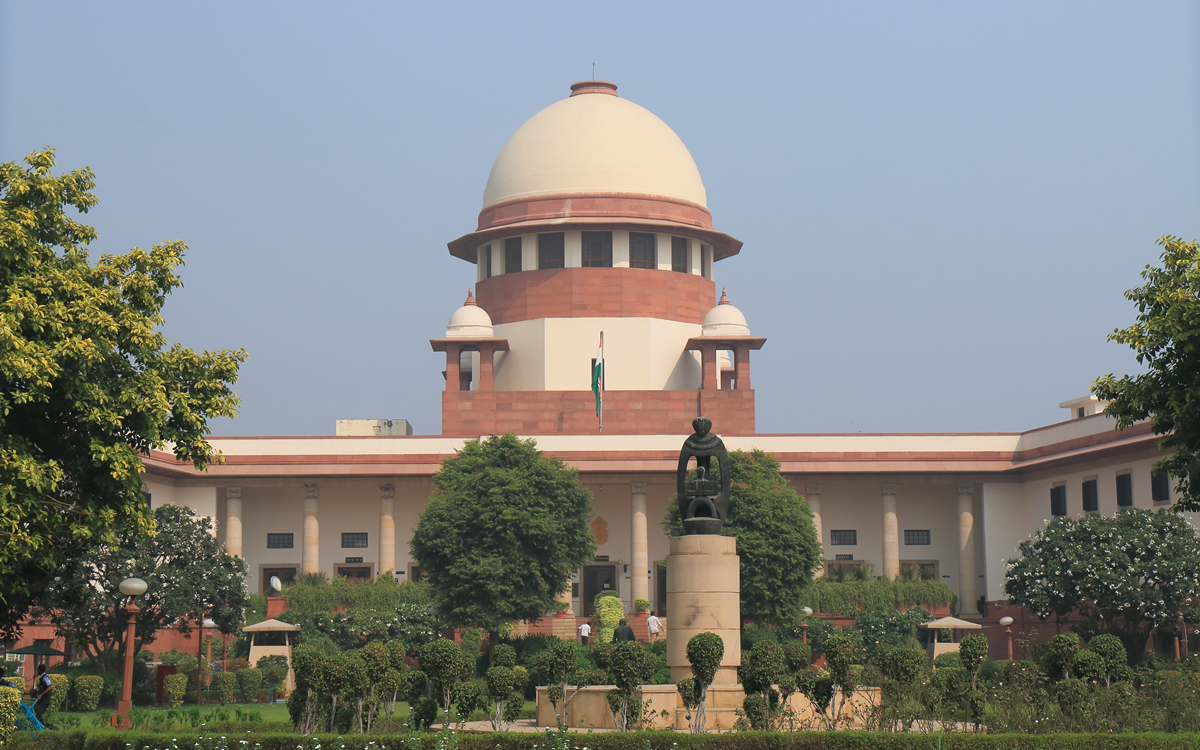
The Indian Supreme Court on Jan. 9 rejected a series of petitions that challenged its 2023 ruling against marriage equality
A 5-judge bench — Justices Bhushan Ramkrishna Gavai, Surya Kant, Bengaluru Venkataramiah Nagarathna, Pamidighantam Sri Narasimha, and Dipankar Datta — said there were no errors in the ruling that justified a review.
A five-judge Supreme Court bench, led by Chief Justice Dhananjaya Yeshwant Chandrachud, on Oct. 17, 2023, in a 3-2 decision ruled against recognizing the constitutional validity of same-sex marriages in India.
The court emphasized it is parliament’s rule to decide whether to extend marriage rights to same-sex couples. It also acknowledged its function is limited to interpreting laws, not creating them.
The judges on Jan. 9 stated they had reviewed the original rulings.
“We do not find any error apparent on the face of the record,” they said. “We further find that the view expressed in both the judgments is in accordance with law and as such, no interference is warranted. Accordingly, the review petitions are dismissed.”
A new bench of judges formed on July 10, 2024, after Justice Sanjiv Khanna unexpectedly recused himself from hearing the appeals, citing personal reasons. The reconstituted bench included Narasimha, who was part of the original group of judges who delivered the ruling.
“The fact that we have lost is a comma and not a full stop for equality,” said Harish Iyer, a prominent LGBTQ+ rights activist in India and one of the plaintiffs of marriage equality case. “The admission of review petitions is a rarity, and while we will proceed with all legal recourses available this is not the only fight.”
Some of the plaintiffs in November 2023 appealed the Supreme Court’s original decision. Udit Sood and other lawyers who had represented them in the original marriage equality case filed the appeal.
The appeal argued the ruling contained “errors apparent on the face of the record,” and described the earlier ruling as “self-contradictory and manifestly unjust.” It criticized the court for acknowledging the plaintiffs face discrimination, but then dismissing their claims with “best wishes for the future,” contending this approach fails to fulfill the court’s constitutional obligations toward queer Indians and undermines the separation of powers envisioned in the constitution. The appeal also asserted the majority ruling warrants review because it summarily dismissed established legal precedents and made the “chilling declaration” that the constitution does not guarantee a fundamental right to marry, create a family, or form a civil union.
While speaking to the Washington Blade, Iyer said this setback is a reminder that our futures can be shaped by collaboration and numerous small victories along the way.
“We will have a multi-pronged approach,” he said. “We need to speak to parents groups, teachers, police personnel, doctors, and medical staff, news reporters, podcasters, grassroots activists, activists from allied movements, our local/state and national level elected representatives. We all need to do our bit in our circle of influence. These small waves will create a force that will help us propel toward marriage equality.”
Iyer told the Blade he is confident the community will achieve marriage equality within his lifetime, offering assurance to every queer individual.
“I just hope that I am not too old to find someone to marry with by then.”
As per the Supreme Court’s rules, a ruling is reviewed only if there is a mistake or error apparent on the face of the record, the discovery of new evidence, or any reason equivalent to these two. Justices typically consider appeals without oral arguments, circulating them among themselves in chambers. The same set of justices who issued the original ruling typically rules on the appeal. In this case, however, Justices Sanjay Kishan Kaul and S. Ravindra Bhat, and Chandrachud, who were part of the original bench, had retired.
Souvik Saha, founder of Jamshedpur Queer Circle, an LGBTQ+ organization that conducts sensitization workshops with law enforcement and local communities, described the Supreme Court’s refusal to hear the appeal as not just a legal setback, but a significant blow to the hopes of millions of LGBTQ+ people across India. He said the decision perpetuates a sense of exclusion, denying the community the constitutional promise of equality under Article 14 and the right to live with dignity under Article 21.
“This decision comes at a time when global momentum on marriage equality is growing,” said Saha, noting Taiwan and more than 30 other countries around the world have extended marriage rights to same-sex couples. “The lack of recognition in India, despite the 2018 Navtej Johar judgment — decriminalizing homosexuality, leaves the LGBTQ community in a vulnerable position.”
Saha further noted in Jharkhand, a state in eastern India where socio-cultural stigmas run deep, the Supreme Court’s refusal highlights the fight for equality is far from over.
He shared the Jamshedpur Queer Circle recently supported a young lesbian couple who were disowned by their families and faced threats when attempting to formalize their relationship. Saha stressed that without legal safeguards, such couples are left without recourse, underscoring the urgent need for marriage equality to ensure protection and recognition for LGBTQ+ people.
“While the decision delays progress, it cannot halt the movement for equality,” said Saha. “Marriage equality is inevitable in a country where nearly 60 percent of Indians aged 18-34 believe that same-sex couples should have the right to marry (Ipsos LGBT+ Pride Survey, 2021.) This ruling highlights the need to shift our advocacy strategy towards building a stronger case for social and political change.”
Saha proposed several calls to action and strategies for moving forward.
He emphasized to the Blade the need for mobilizing the community through state-level consultations and storytelling campaigns to humanize the issue of marriage equality. Saha also highlighted the importance of developing stronger petitions, supported by case studies, international precedents, and data to effectively address judicial concerns.
Saha suggested working with allies in civil society and corporate India to push for incremental changes. He advocated for engaging policymakers in dialogue to promote legislative reforms, emphasizing the economic benefits of inclusion. Saha also called for campaigns to counter misinformation and prejudice, while establishing counseling and support groups for LGBTQ+ people and their families that provide guidance and support.
“Legal recognition of marriage is not just about ceremony; it is about the basic rights, dignity, and respect that every individual deserves,” said Saha. “Together, through collective action, we will ensure that the arc of justice bends in our favor.”
Indrani Chakraborty, an LGBTQ+ activist and mother of Amulya Gautam, a transgender student from Guwahati in Assam state, described the Supreme Court’s appeal denial as an “insensitive approach.”
“Love and commitment are emotions that can never be under boundaries. Rejection of same-sex marriage is an oppressive approach towards the LGBTQI+ community,” said Chakraborty. “This is discrimination. Marriage provides social and legal security to the couple and that should be irrespective of gender. Same-sex relationships will be there as always even with or without any constitutional recognition. The fight should go on, as I believe, this validates the intention. The community needs to stand bold, and equality be achieved.”
India
Harish Iyer continues his fight for LGBTQ+ rights in India
Long-time activist challenged sodomy law, continues marriage equality fight
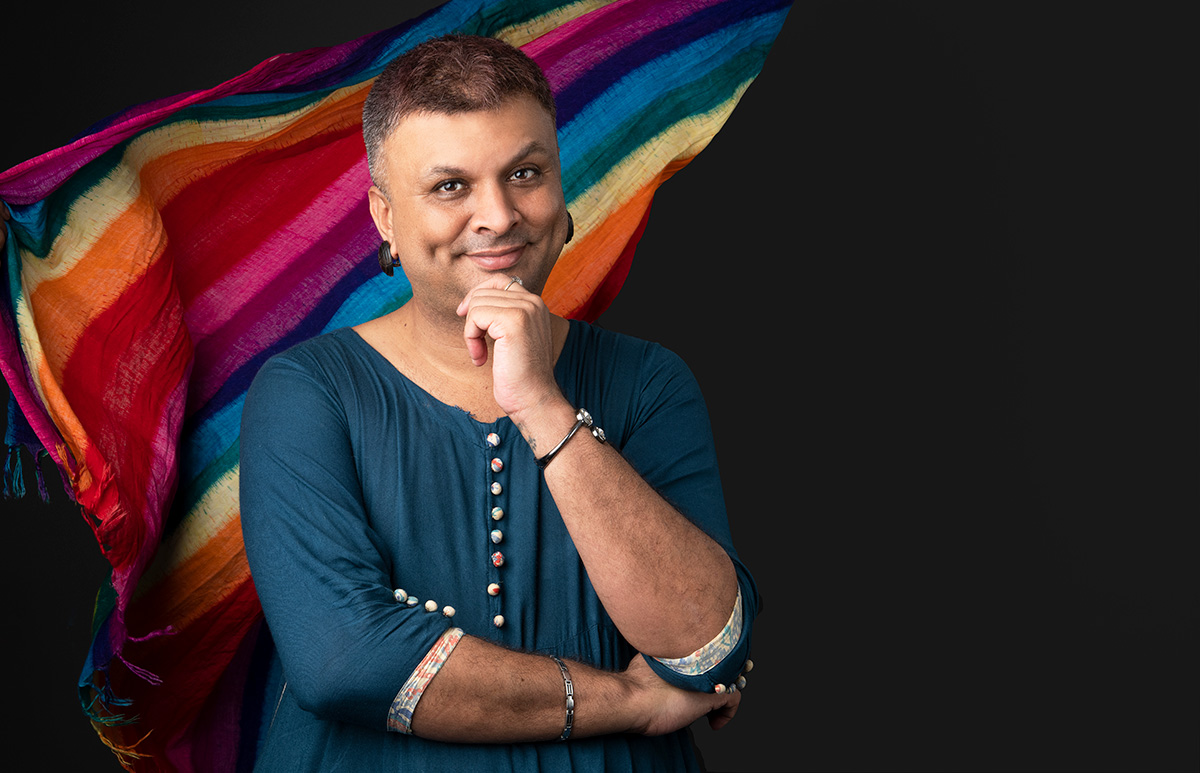
The Indian LGBTQ+ community has long grappled with systemic neglect and societal prejudices, but significant victories like the striking down of Section 377 in 2018 and progressive Supreme Court verdicts have sparked hope. The fight for equality nevertheless remains arduous.
Amid this struggle, Harish Iyer has stood out as a beacon of courage, leading the movement with unwavering commitment and inspiring others to unapologetically embrace their identities.
Iyer, with a slight smile, noted to the Washington Blade during a recent interview that he was born into privilege. As the first male child in a patriarchal society, he explained this status came with inherent advantages.
Despite being born into privilege, Iyer’s early life was marked by profound challenges.
At just 7-years-old, he endured and survived a traumatic experience of rape, an event that deeply impacted his childhood. Iyer said he was gang raped at 11, four years after a relative sexually assaulted him. Iyer told the Blade these assaults impacted his confidence.
“Children go through sexual assault but they do not understand what is happening with them,” said Iyer. “Because they are children, they do not know its language. We do not call a penis a penis, we do not call a vagina, a vagina. I am 45 years of age, and I am talking about 1987 or 1988. People had very little understanding. When you do not have language to say what it is, you don’t say about it.”
Iyer said it is easier for girls to talk about sexual assault compared to boys, and as a result it was harder for him to speak out. He also struggled living in two worlds: One of morals and fairy tales, and another filled with hardships that he tried to mask.
“I opened up about my abuse at 18, after 11 years of continuous trauma,” said Iyer. “That was a different battle altogether. It was 1998-1999, a time with little awareness about child sexual abuse. When I told my parents, my mother understood that a child could be abused. My father, however, was not supportive and didn’t understand what was happening.”
Iyer shared how these events shaped his thoughts, values, and empathy for others facing similar challenges.
At 22, he began to understand his sexuality and came out to his parents as gay. At 40, he realized his gender could be fluid and has identified as gender-fluid since then.
Iyer shared his struggles in finding a job as an openly gay man in India’s conservative society. He now works at Axis Bank, one of India’s largest private banks. Iyer said joining the bank was a unique journey — he did not have any other job opportunities at the time.
“I applied for every job on LinkedIn,” said Iyer. “Axis Bank responded. I thought I’d be unhappy there, but I needed the money, so I applied. The process took a long time, but after several interviews, I was selected. During the interviews, I realized I could be myself. People saw me for who I truly am, and that worked wonders.”
“A week after joining, I started pushing boundaries,” he added. “The chief human resources officer called me to her office. After our conversation, she held me close and said, ‘You should not have to fit in — be who you are.’ Within six months, we created a charter with policies for the LGBTQ community. It’s called ‘Come As You Are.'”
Iyer told the Blade that Chief Human Resources Officer Rajkamal Vempati was upset with him.
She felt he was free to express himself at the company, but wasn’t doing so. Iyer said Axis Bank has a dress code policy for employees — one for men, one for women, and one for LGBTQ+ employees that allows them to choose the gender in which they want to present themselves.
He said he never expected to see such inclusion in a private sector bank in India before joining Axis Bank.
Iyer challenged sodomy law, continues to fight for marriage equality
On the third anniversary of the Supreme Court’s 2018 ruling that struck down Section 377, the provision of the country’s penal code that criminalized consensual same-sex sexual relations, Axis Bank in 2021 introduced policies and a charter for the LGBTQ+ community. Iyer, a long-time LGBTQ+ activist, continues to fight for equal rights.
He said Axis Bank became the first private bank in India to specifically welcome customers from the LGBTQ+ community.
“I was invited by the Social Justice Ministry for a consultation on LGBTQ+ rights,” noted Iyer. “During the discussion, it was proposed that all banks in India should open their doors to the LGBTQ+ community.”
Iyer was one of those who challenging Section 377.
The Supreme Court struck down the colonial-era law on Sept. 6, 2018. Iyer was also a plaintiff in Supriyo v. Union of India, which sought legal recognition of same-sex marriages in India. The Supreme court heard this case in 2023.
“Culture is an evolving phenomenon,” said Iyer. “It is not static. As culture evolves, we as people need to evolve. I would like to believe that my organization is always evolving and we will get better.”
Iyer told the Blade he doesn’t have a specific game plan for the future. As one of Axis Bank’s prominent figures, however, he feels LGBTQ+ people are equal citizens in India.
Nepal
Two transgender women make history in Nepal
Honey Maharjan and Mouni Maharjan ran in local elections last month
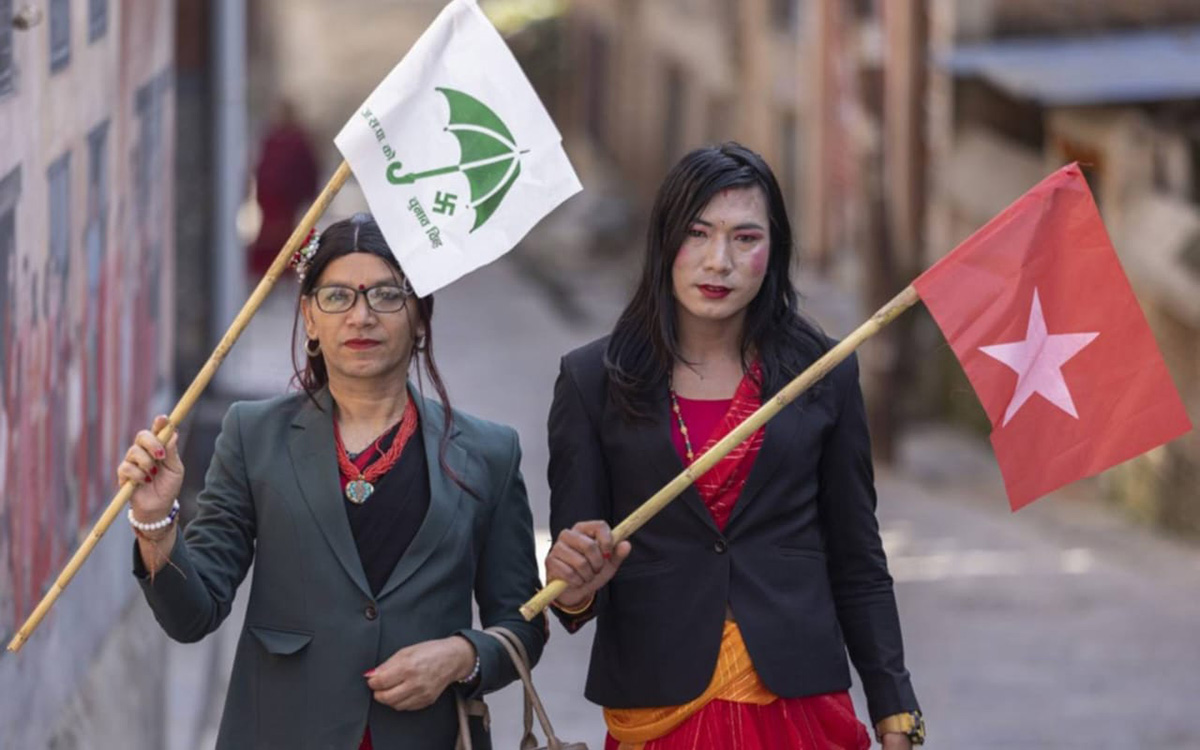
November 22 was a milestone for Nepal’s LGBTQ+ community.
Two transgender candidates, Honey Maharjan and Mouni Maharjan, members of the People’s Socialist Party-Nepal, ran in local elections. It marked the first time that trans people ran for office in the country.
Honey Maharjan ran for mayor in Kirtipur, a municipality outside Kathmandu, the Nepalese capital. Mouni Maharjan ran to become a ward chair in the same municipality. Although both candidates lost the election; experts, and activists consider their participation a significant milestone for LGBTQ+ representation in Nepalese politics.
Honey Maharjan, 44, is a former tour guide who faced discrimination because she is a trans woman. Maharjan nevertheless became a vocal advocate for LGBTQ+ rights.
Mouni Maharjan, 29, advocates for local infrastructure and LGBTQ+-inclusive education. Her campaign focused on introducing an LGBTQ+-inclusive curriculum in schools and creating employment opportunities for marginalized groups.
The Supreme Court in 2007 ruled the government must legally recognize a third gender. Six years later, in 2013, Nepal hosted its first-ever Pride parade, signaling growing visibility and acceptance of the LGBTQ+ community. The country’s new constitution, which ensures equal rights for LGBTQ+ people and all other Nepalese citizens, took effect in 2015.
The Supreme Court in 2018 issued a ruling that expanded protections for LGBTQ+ people in marriage, inheritance, social recognition, and other areas.
Sunil Babu Pant, founder of the Blue Diamond Society, a Nepalese LGBTQ+ rights group, in 2017 became the first openly gay person elected to parliament. Nepal since 2020 has allowed trans people to legally change their gender in official documents without surgery.
A study that UN Women and the Blue Diamond Society published in June 2023 found 81 percent of LGBTQ+ people in Nepal have faced physical violence, discrimination, and verbal abuse. Traditional societal norms and a lack of awareness make this situation worse.
Nepal is seen as a leader in LGBTQ+ rights in South Asia in terms of legal protections and a debate over marriage rights for same-sex couples. A large gap remains between policies and their implementation.
Political representation of LGBTQ+ people remains low.
Pant left office in 2023. There are currently no openly LGBTQ+ people in parliament or in the country’s policy-making policies.
During their campaign in Kirtipur, Honey Maharjan and Mouni Maharjan outlined key promises. They pledged to promote LGBTQ+ inclusion, especially in politics, and vowed to fight discrimination in education, healthcare, and employment.
Their campaigns also focused on ensuring equal rights and opportunities for marginalized groups. Honey Maharjan and Mouni Maharjan promised to raise awareness about LGBTQ+ issues to reduce stigma and discrimination in society.
Honey Maharjan told the Washington Blade said she was happy about running for office, and noted her family and friends supported her.
“Since Kirtipur has a large LGBTQ community still they did not come out to support me,” she said. “Nepal has other political parties like Congress, Communist Party of Nepal (Maoist Center) and many others, we did not had budget like theirs, so it was also our struggle. It is also challenging for us as people are not supporting us for what we are trying to do. They are supporting only prominent political parties in Nepal. So, these are our challenges as a transgender political candidate in Nepal.”
Honey Maharjan told the Blade she would have worked to provide education, health care, and better roads if she were elected.
“I did not win, so I am a little sad this time,” she said. “But I am happy that the media has covered my campaign, so I am grateful to all journalists.”
“Every community member needs to be inspired because we are not alone and we need to think that we have a large number of community members,” added Honey Maharjan. “If we do not come out, there will be difficulty, it’s our right.”
She also dismissed the idea that many trans people are sex workers.
“Many people are working in different sectors. I would request everyone to come out and support the transgender candidate in the next election,” said Honey Maharjan. “Elections are important because it creates awareness about the candidate otherwise everyone would think that transgender community is engaged in sex work only that is not true.”
Asia
Transgender activists celebrate legal advances in India, Pakistan
Akkai Padmashali on Nov. 12 obtained passport for child
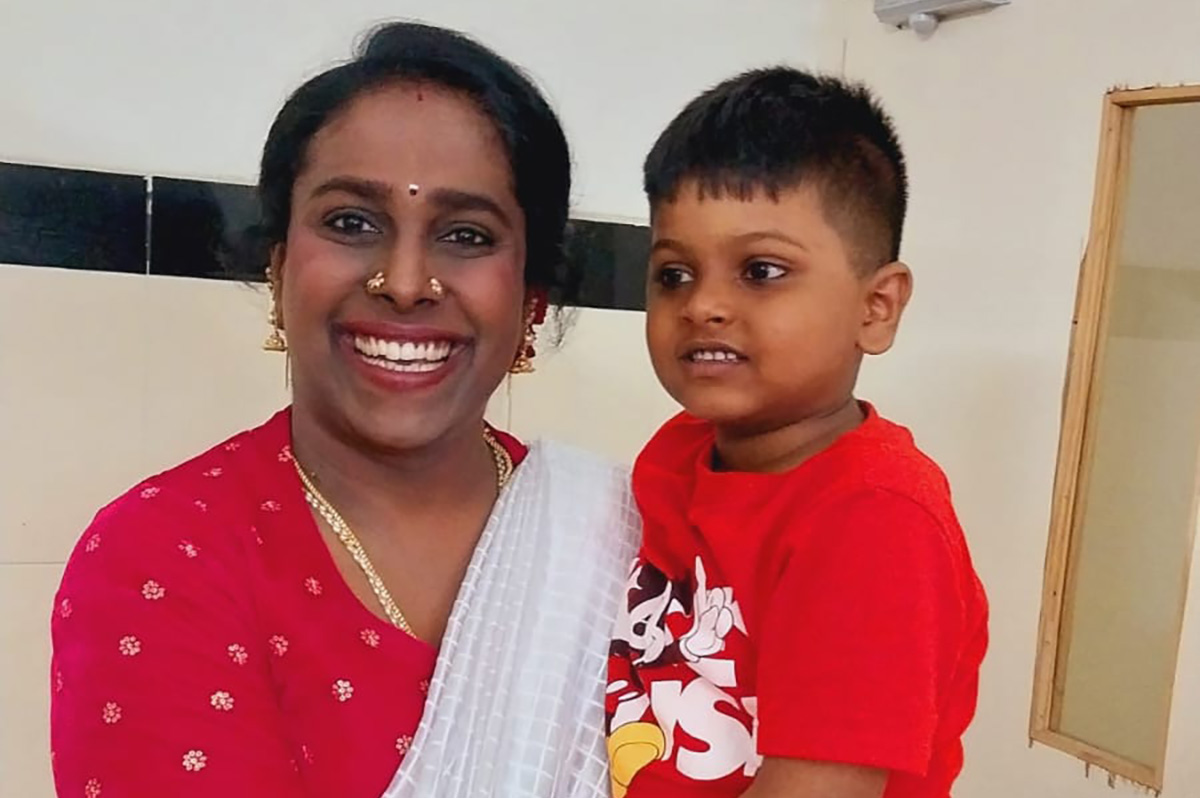
Transgender activists in India and Pakistan are celebrating two legal advances in their respective countries.
Akkai Padmashali, an Indian trans activist, made history on Nov. 12 by obtaining a passport for her 5-year-old child, Avin, without including a father’s name. As a trans woman and single mother, she set a precedent not only for the trans community but for all women in the country raising children on their own.
Padmashali, who is one of India’s most prominent trans activists, in 2019 became the first trans woman in the country to officially adopt a child. A year earlier, she made history in Karnataka by becoming the first trans woman in the state to register her marriage with her husband, Vasudev V.
Padmashali expressed her joy to the media when she adopted Avin, stating she had always dreamed of becoming a mother.
“It has been my dream and desire,” said Padmashali in 2019. “Our families have accepted the baby. It’s heart-warming to see the little one playing on my mother’s lap. I just hope that he does not face any kind of discrimination and social stigma when he grows up.”
In 2019, the same year Avin was born, parliament passed the Transgender Persons (Protection of Rights) Act.
The law seeks to safeguard the rights of trans people and promote their welfare. It includes provisions for issuing identity certificates, protecting against discrimination in education, employment, healthcare, and other sectors, and establishing welfare programs. The law also addressed physical, sexual, verbal, emotional, and economic abuse through protections and rehabilitation programs, introduced complaint officers to handle grievances, and outlined penalties for offenses against trans people.
The Narendra Modi-led government on Dec. 23, 2016, amended the passport policy to accommodate single parents and others who may not wish to include a father’s name in the application. This move was part of broader efforts to streamline and liberalize the passport process in India. One significant change was the modification of the application form, allowing applicants to list either the mother’s name, father’s name, or legal guardian’s name, instead of requiring both parents’ names. The change sought to benefit single mothers, orphans, and children raised by legal guardians.
Padmashali during an interview with the Washington Blade emphasized this issue extends beyond the trans community.
“This is not a question of the community—maybe a single mother, a single parent, most of the women across the world,” she said.
“People are struggling with the identity crisis,” Padmashali added. “In a system of majoritarian, there are so many people who are in the process of questioning the notion of marriage, questions the notion of civil relationship or partnership. Especially in my case, born a male, transformed into a female, and challenged the notion of patriarchal institutions in that way. I claim myself as a woman and also adopting a child, getting the child every document from the government is a big challenge. Especially in the state of Karnataka, I did not find it challenging — very supportive officers, a very supportive government, and a very supportive environment.”
Padmashali told the Blade she was very happy with the process of obtaining a passport for her child, describing it as completely hassle-free.
“I think the passport authority of this country is very sensitive. The passport gives a certain amount of recognition, especially for the transgender community,” said Padmashali. “Many transgender women have also adopted children, but [are] struggling with lots of identity crises.”
“In my case, it was a completely different scenario, I got my passport as a female, and Avin’s also getting the passport without naming the father, I think it’s a national issue,” she added. “From the transgender person’s point of view, I am happy that my Supreme Court has recognized the community and the parliament has recognized the Transgender Protection Act. India is in process of progressing, I would say.”
Pakistan’s Sindh province could implement first-ever Transgender Education Policy
Authorities in in Pakistan’s Sindh province — the country’s third-largest by land and its second most populous — on Nov. 13 approved the first-ever Transgender Education Policy.
The policy includes a separate category for trans children on school and college admission forms, alongside existing male and female options.
Sindh Education Minister Syed Sardar Ali Shah chaired the meeting during which the Transgender Education Policy was approved. A press release says it will now go before the provincial Cabinet for final approval.
The press release notes the proposed policy seeks to eliminate discrimination by providing education for trans children, and introducing job quotas for trans people in the recruitment of teachers.
The Sindh government says trans activists and advocates helped develop the policy.
Shah highlighted the significant challenges faced by the trans community in accessing education, including prejudice, mistreatment, and exclusion. He noted that financial constraints and limited employment opportunities often make education unaffordable, while the fear of harassment in educational institutions further deters transgender individuals from pursuing it. Shah also emphasized that the policy aims to safeguard the identity, safety, and educational needs of trans people.
The press release notes the policy also includes training for teachers to understand the psychological and educational challenges that trans children face. It also aims to develop skills among trans people, and foster a harassment-free environment within educational institutions. The policy seeks to raise public awareness about the need to promote equal opportunities and rights for trans people.
Anusha Tahir Butt, chair of the Transgender Empowerment Organization, said the Transgender Education Policy’s initial approval as a significant step towards greater inclusion and equality for trans people.
“This policy acknowledges the challenges faced by transgender individuals in accessing education and employment, offering them a dedicated space in schools, colleges, and government jobs,” said Butt. “It’s a much-needed step in breaking down the societal barriers of discrimination, harassment, and exclusion that transgender people often face.”
“By including separate categories for transgender children on admission forms and reserving job quotas, Sindh is helping to create a more supportive and equitable environment,” she added. “The policy also focuses on teacher training, anti-harassment measures, and skill development programs, all of which contribute to empowering transgender individuals to lead independent, fulfilling lives. This is a powerful example of how policy can drive social change and encourage a more inclusive society in Pakistan. “
Butt noted societal stigma and prejudice against the LGBTQ+ community remain deeply entrenched in Pakistan, particularly in conservative areas.
“Discrimination and harassment in educational institutions could deter transgender and LGBTQ students from pursuing their education, despite the policy’s provisions for anti-harassment measures,” she said. “Furthermore, effective implementation could be challenged by limited resources, infrastructure, and political will, particularly in rural areas. Bureaucratic delays and gaps in broader legal protections for LGBTQ rights may also impede the progress of these initiatives.”
India
Kamala Harris’s loss prompts mixed reaction in India
Vice president’s mother was born in Chennai

Vice President Kamala Harris’s loss in the U.S. presidential election has elicited mixed reactions among LGBTQ+ activists in India.
A notable portion of Indians expressed support for now President-elect Donald Trump over Harris, even though her maternal lineage traces back to India. Her mother, Shyamala Gopalan, was born into a Brahmin family in Chennai in 1938, and her grandfather, PV Gopalan, hailed from the village of Thulasendrapuram in Tamil Nadu.
Harris’s loss prompted mixed reactions within the LGBTQ+ community.
While some individuals expressed disappointment, others backed Trump.
The Washington Blade in August reported that Harris’s grandfather moved to New Delhi to serve as a civil servant in British-ruled India. This move eventually facilitated Gopalan’s journey to the U.S., where she pursued biomedical science at the University of California, Berkeley a step that played a foundational role in shaping Harris’s future political aspirations.
The Washington Blade since Election Day has spoken with several LGBTQ+ activists and influencers in India.
Harish Iyer, a plaintiff in one of India’s marriage equality cases, in response to Trump’s election said the “path for queer liberation has never been straight.”
“The presidential election was filled with rhetoric from the Republican side against transgender persons,” said Iyer. “There has been a complete denial of the existence of transgender people and also widespread ignominy and ostracism. This, adding to the overturn of Roe vs. Wade, has aggravated tensions for everyone from gender variant persons to birthing parents of all genders.”
He further noted there is a strong change of more transphobic legislation and rhetoric in the U.S. with Trump in the White House, Republicans in control of the U.S. Senate and the U.S. House of Representatives, and a conservative majority on the U.S. Supreme Court.
“In a largely connected world, where many Indians and India-born people are in America, the effect of this will be palpable in India too,” said Iyer.
Indrani Chakraborty is a prominent social activist and advocate for transgender rights, particularly in northeast India. She has been outspoken about the challenges faced by her trans daughter.
Chakraborty said the effects will be felt around the world if Trump continues his transphobic rhetoric and the U.S. government does not support the LGBTQ+ community. Anwesh Kumar Sahoo, an Indian artist, writer, model, and the youngest winner of Mr. Gay World 2016, told the Blade that Trump’s policies are a setback in the ongoing fight for LGBTQ+ rights and visibility.
“It’s a strong reminder of how interconnected our struggles are globally,” said Sahoo. “It highlights the importance of standing up for equality everywhere.”
Abhijit Iyer Mitra, an LGBTQ+ activist and senior fellow at the Institute of Peace and Conflict Studies, in response to Harris’s loss said her Indian roots “really do not matter.”
“America expects assimilation and not just integration,” said Mitra. “She has no real connect to India in any sense or knowledge of India in any sense. So, being from here absolutely means nothing. She is American through and through, she has demonstrated no knowledge of India, no nothing, so it is what it is.”
“I am not really worried, certainly not from an Indian point of view because her particular political supporters are all viciously anti-India, but not Biden,” added Mitra. “Biden is pro-India. But Kamala, especially her supporters, belongs to the same woke circuit which would be… ‘Oh India … genocide happening’ etc. So just being Indian means nothing.”
While responding to the Trump campaign’s rhetoric on trans issues, Mitra said “the issue is not the transgender community, but the forcing of gender ideology on everyone, where you put kids on puberty blockers and have irreversible surgery done, and kids taken away from their parents.”
“I thought I was a girl when I was a kid,” said Mitra. “When I grew up, I realized that I was a man. I am very comfortable being who I am and thank God none of this happened. Had this happened now, I would have been taken away from my parents, asked to undergo surgery, and would not have been able to lead the life I am leading.”
“What is being propagated as this ‘trans ideology’ or ‘gender ideology’ is essentially homophobia, where you are told a man cannot be attracted to a man. A woman cannot be attracted to a woman. They are instead pushed to undergo irreversible sex changes and become something else,” added Mitra. “This is exactly what Iran does — they punish homosexuality with death, but if you have a sex change, it is considered acceptable.”
“There is nothing pro-LGBTQ about the Democrats — far from it. It is an LGBTQ genocide. It is erasing the viability of the LGBTQ community. It is a huge disservice to gender dysmorphic individuals, who are the ones who might genuinely need surgery. But why do they need surgery? It is because they are shunned by society and forced to undergo something that no one should have to endure,” said Mitra. “They need to be accepted and loved for who they are, not turned into something society demands them to be.”
Sarah McBride, a Democrat from Delaware, on Election Day became the first openly trans person elected to Congress. Biden, former President Barack Obama, California Gov. Gavin Newsom, and Illinois Gov. JB Pritzker are among those who specifically mentioned marriage equality and other LGBTQ+ rights during the 2024 Democratic National Convention in Chicago.
“Kamala’s defeat is a huge setback for our friends from the LGBTQ community in the U.S.,” Kalki Subramaniam, an activist, queer artist, and actor who is a member of India’s National Transgender Council, told the Blade.
“As a Tamil woman from Kamala’s mother’s state, I am disappointed that Kamala was not elected,” added Subramaniam. “As Kamala said, never give up and burn bright. For all my LGBTQ families around the world, let us support more leaders like Kamala Harris and strengthen them. Let us step forward and take leadership to win back all our rights.”
-

 a&e features4 days ago
a&e features4 days agoMusical Mondays, a mainstay in WeHo nightlife, celebrates 16 years
-

 National3 days ago
National3 days agoDiscredited former cop played ‘key role’ in deportation of gay make-up artist
-

 Arts & Entertainment2 days ago
Arts & Entertainment2 days agoA Night of legacy, love, and liberation: Inside the 2025 April Fool’s Ball
-

 Arts & Entertainment4 days ago
Arts & Entertainment4 days ago‘Bring it to Brunch’ returns to West Hollywood
-

 Myanmar4 days ago
Myanmar4 days agoLGBTQ+ advocacy group joins Myanmar earthquake relief effort
-

 a&e features4 days ago
a&e features4 days agoPeppermint thrives in the spotlight
-

 California3 days ago
California3 days agoSouth Park provides green space to a predominantly Latino community
-

 Arts & Entertainment2 days ago
Arts & Entertainment2 days agoSouth Coast Repertory Theatre hosting world premiere production
-

 Movies1 day ago
Movies1 day agoHeartfelt ‘Wedding Banquet’ remake a romcom worth seeing
-

 Brazil1 day ago
Brazil1 day agoUS lists transgender Brazilian congresswoman’s gender as ‘male’ on visa





